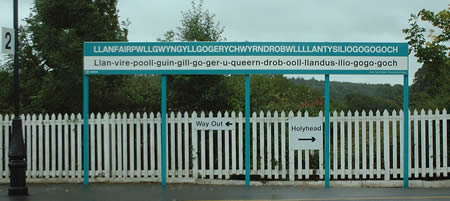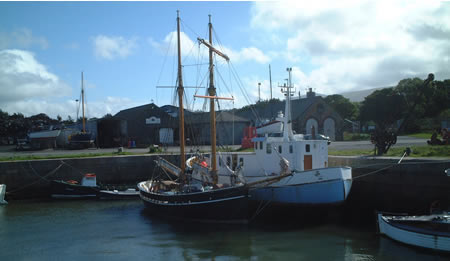An seachtain seo caite, tháinig mo thuismitheoirí go Bangor ar feadh cúpla lá. Thaiscéal muid páirteanna Bangor agus Porth Penrhyn, an port beag in aice le Bangor, agus tiomáin muid timpeall Anglesey (Ynys Môn i mBreatnais). Chuaigh muid go dtí an stáisiún traenach leis an ainm is faide san Bhreatain mhór – Llanfairpwllgwyngyllgogerychwyrndrobwllllantysiliogogogoch (Eaglais Naomh Muire i log an choill bháin in aice leis an bpoll súraic tapaidh agus Naomh Tysilio na huaimhe deirge), nó Llanfairpwllgwyngyll. Níl a lán rudaí ann a fheiceáil san sráidbhaile beag sin ach an stáisiún traenach agus an ionad cuairteoirí mór in aice leis.

Bhreathnaigh muid thart taispeántas iontach ealaín gloine sa stáisiún, agus d’ith muid ár lón sa chaife san ionad cuairteoirí. Ansin chuaigh muid timpeall an oileán agus thug muid cuairt ar iarsmalann an shuimiúil sa Port Amlwch. Stad muid i Feaumaris, ach bhí sé ag cur fearthainn go trom, agus dá bhrí sin ní stad muid i bhfad ansin. Is amhlaidh bhí báisteach ann beagnach an t-am ar fad nuair a bhí mo thuismitheoirí anseo, agus tháinig an grian amach i ndiaidh siad a fhágadh.
Last week my parents came to Bangor for a couple of days. We explored parts of Bangor and Porth Penrhyn, the small port near Bangor, and drove round Anglesey. We went to the railway station with the longest name in Great Britain – Llanfairpwllgwyngyllgogerychwyrndrobwllllantysiliogogogoch (St Mary’s church in the hollow of the white hazel near to the rapid whirlpool and the church of St Tysilio of the red cave), or Llanfairpwllgwyngyll for short. There’s not much to see in the village about from the railway station and the huge visitors’ centre nextdoor.
We had a look round an exhibition of art made from glass in the station, ate some lunch in the visitors’ centre, then went round the island. We visited the very interesting museum in Amlwch’s port and stopped in Beaumaris, by which time it was raining very heavily and we didn’t stay long. In fact it was raining almost all the time my parents were here, and the sun came out after they left – typical!

